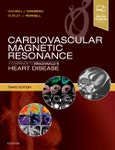- Provides state-of-the-art coverage of CMR technologies and guidelines, including basic principles, imaging techniques, ischemic heart disease, right ventricular and congenital heart disease, vascular and pericardium conditions, and functional cardiovascular disease. - Includes new chapters on non-cardiac pathology, pacemaker safety, economics of CMR, and guidelines as well as new coverage of myocarditis and its diagnosis and assessment of prognosis by cardiovascular magnetic resonance, and the use of PET/CMR imaging of the heart, especially in sarcoidosis. - Features more than 1,100 high-quality images representing today's CMR imaging. - Covers T1, T2 and ECV mapping, as well as T2* imaging in iron overload, which has been shown to save lives in patients with thalassaemia major. - Discusses the cost-effectiveness of CMR. - Expert ConsultT eBook version included with purchase. This enhanced eBook experience allows you to search all of the text, figures, and references from the book on a variety of devices.
Table of Contents
Section 1: Basic Principles of Cardiovascular Magnetic Resonance
1. Basic Principles of Cardiovascular Magnetic Resonance
2. Techniques for T1, T2, and ECV Mapping
3. Accelerated CMR Imaging Methods: Spiral, Radial, Parallel Imaging and Compressed Sensing
4. Cardiovascular Magnetic Resonance Contrast Agents
5. Myocardial Perfusion Imaging Theory
6. Myocardial Perfusion CMR: Advanced Techniques
7. Blood Flow Velocity Assessment
8. Use of Navigator Echoes in Cardiovascular Magnetic Resonance and Factors Affecting their Implementation
9. Cardiovascular Magnetic Resonance Assessment of Myocardial Oxygenation
10. Cardiac Magnetic Resonance Spectroscopy
11. Special Considerations for Cardiovascular Magnetic Resonance: Safety, Electrocardiographic Setup, Monitoring, and Contraindications
12. Pacemaker and ICD Safety and Safe Scanning
13. Special Considerations: Cardiovascular Magnetic Resonance in Infants and Children
14. Human Cardiac Magnetic Resonance at Ultrahigh Fields: Technical Innovations, Early Clinical Applications and Opportunities for Discoveries
15. Clinical CMR Imaging Techniques
16. Normal Cardiac Anatomy
Section 2: Ischemic Heart Disease
17. Assessment of Cardiac Function
18. Stress Cardiovascular Magnetic Resonance--Wall Motion
19. Stress Cardiovascular Magnetic Resonance: Clinical Myocardial Perfusion
20. Acute Myocardial Invarction: Cardiovascular Magnetic Resonance Detection and Characterization
21. Acute Myocardial Infarction: Ventricular Remodeling
22. Myocardial Viability
23. Myocardial Tagging and Left Ventricular Diastolic Function
24. Magnetic Resonance Imaging of Coronary Arteries--Technique
25. Coronary Artery Imaging: Clinical Results
26. Coronary Artery and Sinus Velocity and Flow
27. Coronary Artery Bypass Graft Imaging and Assessment of Flow
28. Atherosclerotic Plaque Imaging: Aorta and Carotid
29. Atherosclerotic Plaque Imaging: Coronaries
30. Assessment of the Biophysical Mechanical Properties of the Arterial Wall
Section 3: Right Ventricular and Congenital Heart Disease
31. Valvular Heart Disease
32. Role of CMR in Dilated Cardiomyopathy
33. T1 and T2 Mapping and ECV in Caridiomyopathy
34. Cardiac Iron Loading and Myocardial T2*
35. Arrhythmogenic Right Ventricular Cardiomyopathy
36. Myocarditis
37. Hypertrophic Cardiomyopathy
38. Cardiovascular Magnetic Resonance Imaging in the Evaluation of Cardiac Transplantation
39. Cardiac and Paracardiac Masses
Section 4: RV and Congenital
40. Cardiovascular Magnetic Resonance Assessment of Right Ventricular Anatomy and Function
41. Simple and Complex Congenital Heart Disease: Infants and Children
42. Simple and Complex Congenital Heart Disease: Adults
Section 5: Vascular/Pericardium
43. Pulmonary Vein and Left Atrial Imaging
44. Thoracic Aortic Disease
45. Cardiovascular Magnetic Resonance Angiography: Carotids, Aorta, and Peripheral Vessels
46. Pulmonary Artery
47. Pericardium in Health and Disease
Section 6: Interventional--Economics
48. Interventional Cardiovascular Magnetic Resonance
49. Pediatric Interventional Cardiovascular Magnetic Resonance
Section 7: Economics and Guidelines
50. Cost-Effectiveness Analysis for Cardiovascular Magnetic Resonance Imaging
51. Cardiac PET/MR
52. Guidelines for CMR
53. Non-cardiac Pathology








